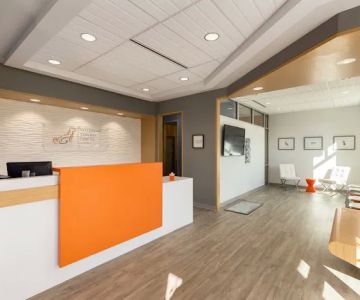How to Prepare Your Pet for Surgery: A Complete Guide for Pet Owners
- 1. Why Preparing Your Pet for Surgery Matters
- 2. Steps to Prepare Your Pet for Surgery
- 3. What to Expect Before, During, and After Surgery
- 4. Real-Life Examples of Pet Surgery Preparation
- 5. How Hidden Brook Veterinary Helps Pet Owners
- 6. Get Started with Surgery Preparation for Your Pet
1. Why Preparing Your Pet for Surgery Matters
Preparing your pet for surgery is crucial for ensuring a smooth procedure and a speedy recovery. Much like humans, pets experience stress and anxiety when faced with surgery, and a well-prepared approach can help reduce these feelings. Proper preparation not only alleviates your pet's discomfort but also improves the overall outcome of the surgery.
Pets rely on us for their health and well-being, especially when it comes to something as serious as surgery. By being proactive in preparing your pet, you're taking a vital step in supporting their recovery. In this guide, we’ll discuss everything you need to know about how to prepare your pet for surgery, ensuring they feel comfortable and cared for every step of the way.

8033 Cooper Creek Blvd # 101, University Park, FL 34201, USA
See Details2. Steps to Prepare Your Pet for Surgery
Here are the key steps to take when preparing your pet for surgery. Whether it's a routine procedure or something more complex, these tips will help make the experience easier for both you and your pet.
2.1. Consult Your Veterinarian Early
Before the surgery, make sure to consult with your veterinarian to discuss the procedure in detail. Understand the reasons for the surgery, the risks involved, and any pre-surgery instructions. Your vet may ask you to stop feeding your pet a few hours before the surgery to prevent complications with anesthesia.
2.2. Follow Pre-Surgery Instructions
Your veterinarian will likely provide you with specific pre-surgery instructions for your pet. This may include dietary restrictions, instructions for fasting, and recommendations on when to stop giving medications. Be sure to follow these instructions carefully to avoid delays or complications on the day of the surgery.
2.3. Create a Calm and Comfortable Environment
In the days leading up to the surgery, it’s important to keep your pet calm and comfortable. Avoid exposing them to stressful situations. You may also want to prepare their recovery space at home, ensuring that it’s quiet and free of distractions where they can relax post-surgery.
2.4. Consider Your Pet’s Emotional Needs
Pets often experience anxiety before surgery. To help ease their nerves, engage in activities they enjoy, such as playtime or cuddling. A familiar routine can offer reassurance and comfort. Some pets benefit from having an item of yours, such as a shirt, that carries your scent with them during their stay at the veterinary clinic.
2.5. Plan for Post-Surgery Care
Preparing for surgery isn't just about the procedure itself—it's also about post-surgery recovery. Set aside time for aftercare, which may include administering medications, limiting your pet's physical activity, or making regular vet visits to monitor their healing progress.
3. What to Expect Before, During, and After Surgery
Understanding what will happen at each stage of the surgery process can help you feel more confident and prepared. Here’s what to expect before, during, and after your pet’s surgery:
3.1. Before Surgery
Before the surgery, your veterinarian will conduct a thorough examination to ensure your pet is healthy enough for the procedure. Blood tests and possibly other diagnostics may be performed to minimize any risks. On the day of surgery, make sure your pet is calm, and follow the fasting guidelines provided by your vet.
3.2. During Surgery
While your pet is under anesthesia, the surgical team will monitor their vital signs closely. The veterinarian will perform the procedure while ensuring your pet’s comfort and safety. The length of the surgery depends on the complexity of the procedure, and your vet will provide an estimated time for you to expect the procedure to be completed.
3.3. After Surgery
After the surgery, your pet will be monitored during the recovery period. Depending on the procedure, they may need to stay at the clinic for a while or be sent home with specific instructions. Be prepared to offer extra care, including managing pain, helping them with movement, and providing a quiet recovery space. Your vet will schedule follow-up appointments to ensure your pet is healing properly.
4. Real-Life Examples of Pet Surgery Preparation
One example of successful surgery preparation is the case of "Bella," a dog who needed knee surgery. Her owner, Janet, took the time to consult with the veterinarian beforehand, follow pre-surgery instructions, and create a calm environment for Bella. Janet also arranged for post-surgery care, including helping Bella with her mobility and administering pain medication as directed. As a result, Bella had a smooth recovery and returned to her usual activities in just a few weeks.
Another example is "Whiskers," a cat who had a dental procedure. Whiskers’ owner, David, made sure to follow the fasting instructions and provided a comfortable recovery space at home. After surgery, David was diligent about providing the prescribed medications and monitoring Whiskers for any changes. Whiskers recovered well and was back to grooming and eating normally within a few days.
5. How Hidden Brook Veterinary Helps Pet Owners
At Hidden Brook Veterinary, we understand how stressful it can be to prepare your pet for surgery. Our experienced team provides clear guidance and personalized care to ensure your pet's surgery and recovery process are as smooth as possible. Whether it's explaining the procedure, offering comfort tips, or supporting you throughout the aftercare process, we're here for you and your pet.
6. Get Started with Surgery Preparation for Your Pet
Proper preparation can make a world of difference when it comes to your pet’s surgery and recovery. By following the steps above and seeking professional guidance, you can ensure a successful outcome. If your pet is scheduled for surgery, consult with your veterinarian to discuss the best plan for your pet’s health and well-being.
For expert veterinary care and guidance, visit Hidden Brook Veterinary today. Our team is committed to providing the best care for your pet before, during, and after surgery.











